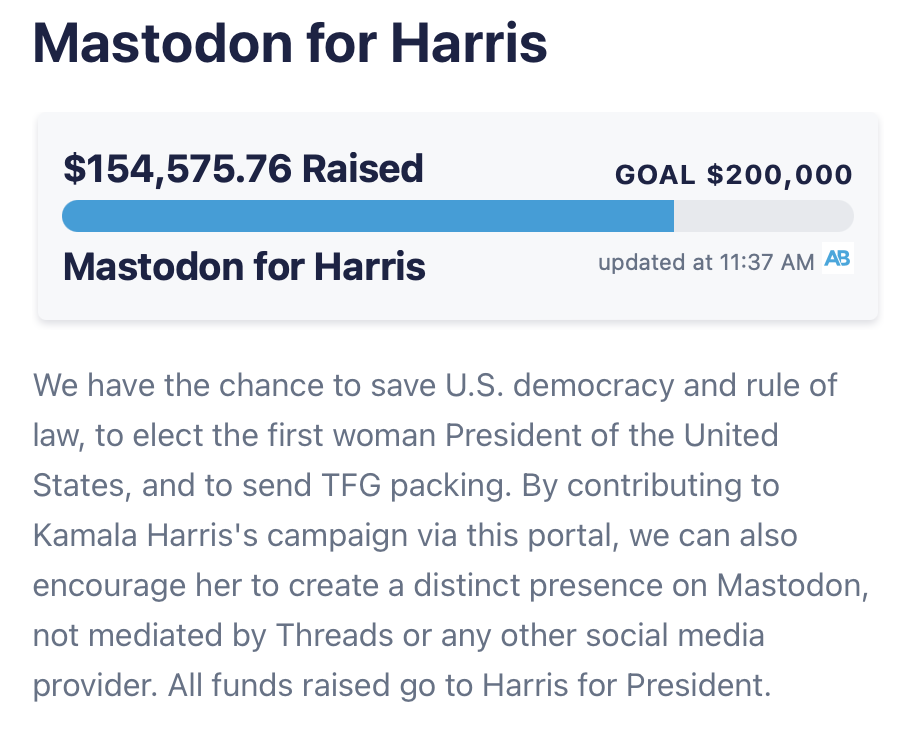It’s a Thing!
Das Fediverse tut sich schwer, das volle Potential der verschiedenen Activity-Objects auszunutzen, hauptsächlich aus Angst, sie falsch oder schlecht darzustellen und deshalb teilen die meisten großen Netzwerke leider nur Notes.<p>Dabei könnte es so einfach sein!</p><p><a href="https://social.wedistribute.org/users/deadsuperhero">@<span>deadsuperhero</span></a> schreibt auf seinem Blog, dass er eigentlich gerne Articles veröffentlichen will, aber (hauptsächlich) durch Mastodon zu Note gezwungen wird, wenn er sicher gehen will, dass der Text […]</p>
Notes.Dabei könnte es so einfach sein!
@deadsuperhero schreibt auf seinem Blog, dass er eigentlich gerne Articles veröffentlichen will, aber (hauptsächlich) durch Mastodon zu Note gezwungen wird, wenn er sicher gehen will, dass der Text vollständig dargestellt wird.
Here’s the problem, though: the biggest player in the space, Mastodon, does a poor job of supporting Article. Instead, every post Mastodon uses is instead a Note. From a semantic point of view, it might not seem like there’s a lot of difference between the two: both are effectively texts posts that can contain some formatting markup, both can hold an arbitrary amount of characters, and both can effectively be used to represent a full article.
Ironischerweise zeigt Mastodon eine föderierte Note vollständig an, auch wenn der Text weit über die eigentlich erlaubten 500 Zeichen hinaus geht, bei einem Article wird statt dessen aber nur die kurze summary benutzt.
Seine Idee: Ein Content-Fallback Mechanismus!
Das heißt jede Aktivität, egal von welchem Typ, liefert zusätzlich zu dem spezifischen Objekt, eine standardisierte Note (content-fallback):
{ "@context":[ "https://www.w3.org/ns/activitystreams", { "Hashtag":"as:Hashtag" } ], "id":"https://wedistribute.org/2024/04/iftas-dsa-guide/", "type":"Article", "content-fallback": { "content":"IFTAS, the dedicated Trust & Safety organization ...", "mediaType":"text/plain", "summary":"", "tag":[{ "href":"https://wedistribute.org/tags/fediverse", "name":"#fediverse", "type":"Hashtag" }], "type":"Note", "updated":"2024-04-11T20:55:29Z" }}Code-Sprache:JSON / JSON mit Kommentaren(json)Ich verstehe das Problem und finde die Idee generell nicht schlecht, aber eigentlich bietet ActivityPub alles Nötige schon von Haus aus! ActivityPub oder besser ActivityStreams ist so aufgebaut, dass alle Objekte von einem Art Base-Object abgeleitet werden. Das heißt Article, Note, Event oder Place, haben ein gleiches Minimal-Set an Attributen:
attachmentattributedToaudiencecontentcontextnameiconimageinReplyTopublishedrepliessummarytagupdatedurltobtoccbccmediaType- …und mehr
Und auch wenn beispielsweise Place oder Event einige spezifische Eigenschaften haben, die nicht jede Plattform „kennt“ und „versteht“, sollte es immer möglich sein, die Beschreibung (content oder summary) und den Titel (name) anzuzeigen.
Das Prinzip ist ähnlich wie, wenn nicht sogar inspiriert durch, schema.org/Thing. Auch hier basieren alle Objekte letztendlich auf einem Thing und trotz der wesentlich größeren Anzahl1 an Objekten und Attributen, können Suchmaschinen sich immer sicher sein, dass es zumindest einen name, eine description und eine url zum Anzeigen gibt.
Bevor wir über also über ein `content-fallback` nachdenken, sollten wir (meiner Meinung nach) erst einmal dafür sorgen, dass die vorhanden Möglichkeiten richtig genutzt werden.
- The vocabulary currently consists of 806 Types, 1474 Properties 14 Datatypes, 90 Enumerations and 480 Enumeration members. – https://schema.org/docs/schemas.html↩︎




